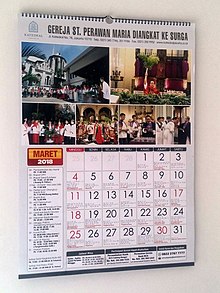
Back Kalender Afrikaans Kalender ALS የቀን መቁጠሪያ Amharic Calandario AN Gerīmbōc ANG تقويم Arabic ܣܘܪܓܕܐ ARC تقويم ARY দিনপঞ্জী Assamese Calendariu AST
The examples and perspective in this article deal primarily with Eurasia and the Near East and do not represent a worldwide view of the subject. (September 2022) |
| May | ||||||
|---|---|---|---|---|---|---|
| Su | Mo | Tu | We | Th | Fr | Sa |
| 1 | 2 | 3 | 4 | |||
| 5 | 6 | 7 | 8 | 9 | 10 | 11 |
| 12 | 13 | 14 | 15 | 16 | 17 | 18 |
| 19 | 20 | 21 | 22 | 23 | 24 | 25 |
| 26 | 27 | 28 | 29 | 30 | 31 | |
| 2024 | ||||||


A calendar is a system of organizing days. This is done by giving names to periods of time, typically days, weeks, months and years.[1][2][3] A date is the designation of a single and specific day within such a system. A calendar is also a physical record (often paper) of such a system. A calendar can also mean a list of planned events, such as a court calendar, or a partly or fully chronological list of documents, such as a calendar of wills.
Periods in a calendar (such as years and months) are usually, though not necessarily, synchronized with the cycle of the sun or the moon.[4][5][6] The most common type of pre-modern calendar was the lunisolar calendar, a lunar calendar that occasionally adds one intercalary month to remain synchronized with the solar year over the long term.
- ^ "Calendars and their History". eclipse.gsfc.nasa.gov. Retrieved 12 March 2024.
- ^ Guo, Rongxing (16 May 2018). Human-Earth System Dynamics: Implications to Civilizations. Springer. p. 159. ISBN 978-981-13-0547-4.
- ^ Bond, Thomas; Hughes, Chris (3 December 2013). Singapore PSLE Mathematics Challenging Practice Solutions (Yellowreef). Yellowreef Limited. ISBN 978-0-7978-0222-3.
- ^ "Do menstrual and lunar cycles synchronize? What scientists say". www.medicalnewstoday.com. 12 February 2021. Retrieved 12 March 2024.
- ^ "Introduction to Calendars". aa.usno.navy.mil. Retrieved 12 March 2024.
- ^ "History – Ancient Egyptian Calendar" (PDF). Retrieved 12 March 2024.
© MMXXIII Rich X Search. We shall prevail. All rights reserved. Rich X Search